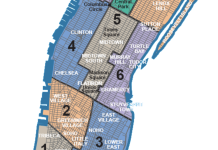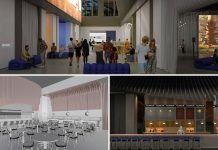
Virtuoso guitarist, composer and multimedia artist Vernon Reid explores the vicissitudes of identity and authenticity in “Artificial Afrika – A Tale of Lost Cities,” a new performance piece commissioned and presented by Dixon Place.
Premiering Feb. 10, the piece is being performed in a limited run on Feb. 11, 17-18, 24-25. In “Artificial Afrika” the two-time Grammy Award-winner leverages hip hop, computer animation, video and dance to challenge conventional assumptions about the idea of Africa. This latest creation has Reid, best known for his band Living Colour, collaborating with hip hop performance artist Akim Funk Buddha, who’s also a throat-singer, among other talents, and DJ/drummer/filmmaker/producer Leon Lamont.
“Artificial Afrika” is a meditation on and journey through Africa, a continent brimming with diverse cultures, languages and peoples — and what Reid describes as “a notional landscape,” encompassing everything from Aunt Jemima to Tarzan, “filled with our fear and desire and hope and despair.”
The piece is “about the Africa in our minds,” Reid offered in an interview with The Lo-Down. “We walk around with all these ideas about Africa—deepest darkest Africa, mother Africa, heart of darkness, Tarzan, Aunt Jemima—this piece explores the question of what do they all mean.”
Reid’s been playing with the concept since 1989. While on tour with his band Living Colour, he picked up a darkie figurine in a shop in the south—in Birmingham, Alabama or somewhere in North Carolina—he can’t remember exactly. “I thought, what does it mean to be a person who identifies Africa as part of his heritage but has experienced very little about Africa other than what is presented on TV and in movies?”

“Artificial Afrika draws its inspiration from that frightening place of the surreal, the complete breakdown of human relations,” he adds. It’s also influenced by My Life in the Bush of Ghosts, a 1981 album by Brian Eno and David Byrne which, in turn, was inspired by Nigerian writer Amos Tutuola’s 1954 book of the same name. Reid’s been working on “Artificial Afrika” off and on since about 2001.
Reid was born in London to Caribbean parents from the island of Montserrat. He grew up in New York City, went to Brooklyn Technical High School and New York University. Perhaps best known as a guitarist who’s played with the likes of Carlos Santana and The Ramones and opened for the Stones’ 1989 Steel Wheels tour, Reid’s also a prolific visual artist, multi-instrumentalist, poet, essayist and composer. “I started as a visual artist, then became a guitarist and eventually I got back to photography,” he told us.
Asked which medium he’s most emotionally connected to: “I want to say that there’s a person who’s trying to emerge and figure out, ‘How’d I get here?’ I’m a person who picked up the guitar and I love it very much. I am still learning technically but I also have developed a voice that’s my own particular voice,” Reid said. And like his exploration in “Artificial Afrika,” Reid’s constantly probing his own identity as an artist. “I think of art as this construct, creation or evolutionary riddle that is named Vernon Reid, and that experience is attempting to find its voice in different media.”
In “Artificial Afrika,” audiences will experience Reid’s meditation on identity and it’s power as an organizing principle in one’s life. “(Our) identity has been either championed, seized upon or foisted on. Identity has been pushed onto people and it’s how we see ourselves, who tells us who we can be. Who do we allow to define what we make of our lives?” Reid explained.
“I really believe that art and music, whether improvised or painted, is the gateway to the other reality and that we’re always trying to figure out whether it’s real or not. When you hear something that’s just awesome, it doesn’t even matter what it is, whether it’s complex or simple and the person could be an expert or a novice, but when it happens, it’s a kind of magic. I believe in the possibility of that magic,” he said.
“Artificial Afrika — A Tale of Lost Cities” plays Fridays and Saturdays in February at 7:30 p.m. at Dixon Place, 161A Chrystie Street. Call 212-219-0736. Tickets are $15 in advance online, $18 at the door and $12 students/seniors.










